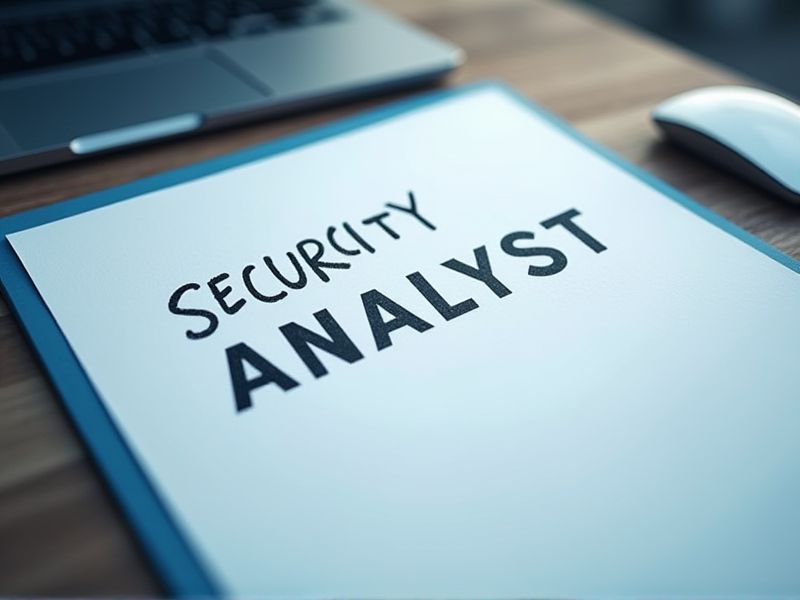
Employers often seek certified professionals as a guarantee of proficiency and reliability in cybersecurity roles. Certifications provide a structured learning path and ensure familiarity with the latest industry standards and practices. They play a crucial role in validating a candidate's ability to manage complex security challenges. Some pivotal certifications may be essential for a Cybersecurity Analyst.
CompTIA Security+
Employers often view CompTIA Security+ as a benchmark for foundational cybersecurity skills, which directly impacts hiring decisions for cybersecurity analyst roles. The certification covers a broad range of essential security concepts, such as threat management and cryptography, that directly contribute to an analyst's job performance. Security+ aligns with DoD 8570 requirements, making it a necessary qualification for government cybersecurity positions. It ensures that analysts possess verified knowledge to apply best practices in real-world security situations, elevating overall organizational cybersecurity posture.
Certified Information Systems Security Professional (CISSP)
The Certified Information Systems Security Professional (CISSP) credential provides a comprehensive understanding of cybersecurity principles, essential for a security analyst to tackle complex security challenges effectively. As cyber threats become more sophisticated, the structured knowledge from CISSP equips analysts with current best practices and methodologies to design robust security systems. The certification enhances credibility and trust, making it easier for analysts to communicate security strategies to stakeholders. Many employers recognize CISSP as a standard benchmark, increasing job prospects and potential for career advancement for cybersecurity analysts.
Certified Ethical Hacker (CEH)
The rise in cyber threats necessitates advanced defense mechanisms, and CEH provides comprehensive knowledge of hacker tactics, enhancing a cybersecurity analyst's ability to counteract potential attacks effectively. Understanding a hacker's mindset and methodologies through CEH training enhances an analyst's ability to anticipate vulnerabilities, leading to more robust security frameworks. CEH-certified analysts possess the practical skills necessary for penetration testing, ensuring preemptive measures can be enacted to protect sensitive information. The certification equips analysts with the tools to conduct thorough threat assessments, enabling organizations to fortify their defenses in an evolving cyber landscape.
CompTIA Cybersecurity Analyst (CySA+)
The CompTIA CySA+ certification equips cybersecurity analysts with validated skills in threat detection and data analysis, which are critical for identifying and mitigating cyber threats. Employers increasingly seek knowledgeable professionals who can proactively defend against evolving cyber-attacks, and CySA+ certification indicates proficiency in these areas. This certification bridges the gap between entry-level security expertise and higher-level cybersecurity roles, enabling analysts to effectively manage complex security infrastructures. Organizations benefit from CySA+-certified professionals who can enhance security operations by employing advanced monitoring and risk management strategies.
GIAC Security Essentials (GSEC)
The GIAC Security Essentials (GSEC) certification equips cybersecurity analysts with foundational knowledge in security concepts, critical for identifying and mitigating threats. As the threat landscape evolves, analysts with GSEC certification stay updated on best practices, promoting effective incident response strategies. Companies often require GSEC certification to ensure analysts possess validated skills in managing security operations and defenses. The certification also enhances an analyst's credibility, boosting career opportunities and professional growth within the cybersecurity sector.
Certified Information Security Manager (CISM)
The CISM certification validates a cybersecurity analyst's skills in risk management, ensuring they can effectively prioritize and mitigate potential threats. Organizations facing sophisticated cyber threats often require professionals with a deep understanding of information security governance, which CISM provides. Having a CISM certification enhances an analyst's credibility and demonstrates a commitment to understanding the integration of information security with business objectives. The certification leads to improved strategic alignment between IT security and organizational goals, as CISM holders are trained to develop and manage enterprise-level security programs.
Certified Information Systems Auditor (CISA)
Obtaining the Certified Information Systems Auditor (CISA) credential enhances a cybersecurity analyst's ability to effectively assess and manage risks related to information systems. Expertise verified by CISA ensures the analyst can create robust audit strategies, improving overall system security. Recognition of the CISA certification in the field facilitates career advancement and fosters professional credibility. This credential aligns with organizational needs, reflecting an understanding of best practices in information systems control and assurance.
Offensive Security Certified Professional (OSCP)
The OSCP certification demonstrates hands-on ability to conduct ethical hacking in real-world scenarios, which enhances a cybersecurity analyst's proficiency in identifying vulnerabilities. Employers often value OSCP because it ensures that candidates have practical experience in penetration testing, a critical skill for proactive defense strategies. Achieving OSCP requires solving complex security challenges, which hones problem-solving capabilities essential for assessing and mitigating security threats. The certification elevates a cybersecurity analyst's credentials, making them more competitive in the job market where validation of skills is crucial.
Cisco Certified CyberOps Associate
Organizations face an increasing number of cyber threats, creating a high demand for skilled cybersecurity professionals. The Cisco Certified CyberOps Associate certification equips individuals with the necessary skills to effectively monitor, detect, and respond to security incidents, aligning with the core responsibilities of a cybersecurity analyst. As companies increasingly adopt network security measures, professionals with this certification demonstrate their capability to manage and protect IT infrastructures. This certification also provides foundational knowledge of cybersecurity tools and technologies, giving analysts an advantage in identifying and mitigating potential vulnerabilities.
Certified Cloud Security Professional (CCSP)
The role of a Cyber Security Analyst benefits significantly from a Certified Cloud Security Professional (CCSP) designation by equipping them with specialized knowledge in protecting cloud environments. With increasing reliance on cloud technology, possessing a CCSP signals an in-depth understanding of cloud architecture security. This certification enhances a professional's ability to identify and mitigate risks associated with cloud-based cyber threats. Employers often seek professionals with a CCSP to ensure they can effectively safeguard sensitive data in cloud platforms.
Summary
By obtaining cybersecurity certifications, you enhance your credibility in the industry, leading to more job opportunities. These credentials validate your skills, allowing you to demonstrate proficiency in specific tools and practices. Employers often perceive certified professionals as more capable, which can result in higher salaries. Your advanced knowledge from certifications can help in effectively mitigating and responding to cyber threats, boosting overall organizational security.
